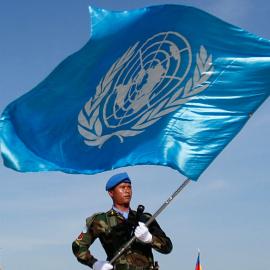To the Editor:
For a scholar who has offered much on the causes and consequences of war, Edward Luttwak's latest contribution is a disappointing and simplistic compilation of old arguments and wrong conclusions ("Give War a Chance," July/August 1999).
The idea that peace agreements and humanitarian assistance fuel wars is hardly a new one. More than ten years ago, William Zartman argued that wars must run their course before they become "ripe for resolution." And it was pointed out long ago that most internal wars end with victory by one side, rather than with negotiated settlements (unlike international wars, where the reverse is true). That humanitarian assistance can sometimes have the perverse consequence of fueling conflict -- such as in the refugee camps in eastern Zaire and Somalia -- has been widely acknowledged, including in official U.N. reports.
Yet U.N. officials, nongovernmental actors, and others continue to engage in peacemaking efforts, seek support for peacekeeping operations, and persist in providing humanitarian assistance in the middle of wars. Are we blind to theories of war? Are we, as Luttwak suggests, simply acting on the basis of "disinterested and indeed frivolous motives," responding to public pressures that result from the media coverage of wars? Or is something a bit more nuanced going on?
There is a growing and improving body of scholarship on the causation of war, its dynamics, and of most relevance here, war termination. At the same time, the U.N. and other world bodies are gaining more experience in civil-war negotiating, especially in this post-Cold War period. We are daily asking the same questions: What causes wars to end? What stops them from restarting? Do peacemaking efforts contribute in a positive way, and if so, under what conditions?
These questions are prompting a nuanced set of answers. As Stephen Stedman has argued, preventive diplomacy and peacekeeping are policy tools that are effective in certain types of cases. True, some wars simply exhaust themselves -- though even in such cases, it is almost always necessary that an independent third party like the U.N. be on hand to help combatants steer the path from war fatigue to peace negotiations. And there are cases when the only just outcome is victory by one side -- like the defeat of Rwanda's genocide forces, for instance. But what about Bosnia? In 1992-94, should we have let "the strong defeat the weak faster and more decisively?"
There are wars in which peace processes do make a difference. Peter Wallensteen's data attribute the decline in the number of wars worldwide to multifaceted peace agreements, such as those negotiated in Namibia, El Salvador, and Mozambique (all of which are notably absent from Luttwak's repertoire of stories). Virginia Page Fortna conducted an empirical review of peace agreements and concluded that, when they incorporate key elements, peace agreements do help the transition from war to sustained peace.
Yet this data is nowhere reflected in Luttwak's article. Moreover, Luttwak treats civil wars as if they were isolated events that should be left alone to peter out. Michael Brown already demolished this misperception of civil wars with compelling evidence that characterized almost all so-called internal wars as regional and international, at least in part; neighboring states, Brown writes, are "often active contributors to military escalation." Because regional actors are usually involved, even decisive military victory by one side (Luttwak's preferred solution) can lead to new wars and instability in neighboring countries.
Luttwak paints a uniform picture of war, when in fact the phenomenon is complex. He argues that "hopes of military success must fade for accommodation to become more attractive than further combat." How can civil wars like the one in southern Sudan, which has lasted since 1956, be explained? Surely not by arguing that humanitarian aid has sustained it. How long must a war continue without external mediation, per Luttwak's theory? U.N. officials in such places as eastern Angola, northern Sierra Leone, and the eastern areas of the Democratic Republic of the Congo face the fact that rebels fight not for victory but because fighting itself offers power and wealth. In such cases, not only is victory by one side an unlikely outcome, but war can sustain itself over generations. Worse yet, civilian suffering does not impose costs on the warring parties. Instead, the combatants make profits by plundering national wealth -- extracting diamonds, timber, opium, and strategic minerals, for instance -- not by taxing the populations under their control (whose minimal wealth has already been depleted by decades of war).
In such cases, should successive generations suffer continually from forced displacements, attacks, the denial of human rights, deprivation, and even starvation, all without any assistance from the international community? Humanitarian assistance by itself is never a solution, and elements of it can at times be a problem. But if humanitarian assistance does so much to aid combatants, why do rebels often try so hard to keep it out? To deny aid altogether is not only unhelpful, it is unthinkable. Such options were permanently banished 50 years ago through the Geneva Conventions.
Civil war is a multifaceted problem for which the international community must have a variety of policy resources, both in peacemaking and in humanitarian assistance. We at the U.N. rely on good scholarship to help us sort out which policy tools will be effective in which kinds of cases. But oversimplified accounts far removed from the complexities of actual war and blanket statements that lead to quietism do not help.
SERGIO VIEIRA DE MELLO
United Nations Undersecretary-General for Humanitarian Affairs
